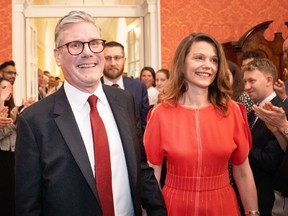The recent shift in the British political landscape following Thursday’s election has sparked renewed hope for a possible free-trade deal between the United Kingdom and Canada.
A Changing of the Guard in the U.K.
On Friday morning, Keir Starmer officially became prime minister after being appointed by King Charles III, following the resignation of Conservative Leader Rishi Sunak. The British electorate delivered a landslide victory to Labour, securing 412 out of Parliament’s 650 seats and handing the Tories a historic loss.
A Strong Partnership between Canada and the U.K.
According to Achim Hurrelmann, a professor of political science at Carleton University, the two countries have maintained strong ties despite their differences in party affiliations. "Even though the Canadian Liberal Party and the Conservative Party in the U.K. are of different party families, they have generally worked well together on trade issues," he said.
A Continuity Agreement in Place
In the meantime, a continuity agreement remains in place that keeps most of the former European Union trade rules intact until a separate deal is signed. The U.K. is Canada’s fourth-largest trading partner, with bilateral trade amounting to approximately $45 billion annually.
A New Era for Trade Talks between Canada and the U.K.
On Friday morning, Prime Minister Justin Trudeau congratulated his new counterpart in a statement, expressing his commitment to concluding the trade deal. "Our countries enjoy robust economic ties, and I look forward to further strengthening them with Prime Minister Starmer," he said.
The Labour Party’s Pledge on International Relationships
The Labour Party has pledged to reset international relationships and start inking new trade deals, including one with Canada. Its election manifesto stated that it would not reverse Brexit but work on "tearing down unnecessary barriers to trade" with the European Union.
Hurrelmann’s Expectations for Trade Talks
Hurrelmann expressed skepticism about the prospect of urgent negotiations between Canada and the U.K., stating that the underlying issues in trade talks have remained largely unchanged. He believes that these non-partisan concerns are not significant enough to prompt a rapid return to the negotiating table.
Lessons from the British Experience for Canadian Politicians
Hurrelmann pointed out that there may be lessons for Canadian politicians in the resounding defeat of an incumbent government that had been in power for over 14 years and was widely seen as neglecting the everyday concerns of citizens. He noted that Justin Trudeau’s Liberals have been in power for nine years, with the next federal election set to take place by October 2025.
Growing Calls for a New Liberal Leader
There have also been increasing calls for Trudeau to step aside, with some pundits and former cabinet ministers musing about a future without him at the party’s helm. Hurrelmann suggested that the British Conservatives’ experience could serve as a cautionary tale for those hoping a new Liberal leader will turn the tide of poor polling.
A Cautionary Tale for Canadian Politicians
Hurrelmann observed that if there are large-scale public opinion trends, simply changing the face of the prime minister may not be enough to address them. This is evident in the U.K.’s recent experience with multiple prime ministers since Boris Johnson’s departure.
Conclusion
The new U.K. government has rekindled hopes for a free-trade deal between Canada and the U.K., but it remains uncertain whether negotiations will progress rapidly or stall due to underlying concerns. As both countries navigate their respective trade relationships, there may be lessons from the British experience that Canadian politicians can draw upon in shaping their own international relationships.



